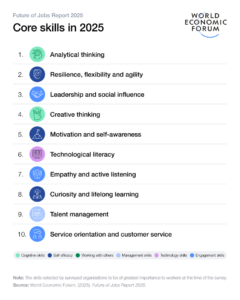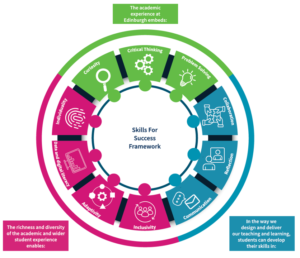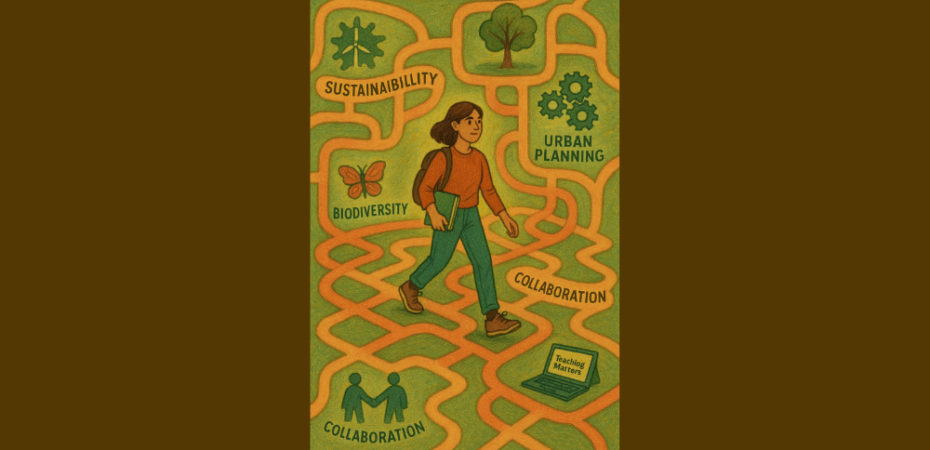
In this post, Gavin McCabe discusses how interdisciplinary education can prepare students for professional work in a complex world. Gavin is a Careers and Employability Manager at the University’s Careers Service. This post belongs to the ‘Navigating complexity through interdisciplinary teaching and learning‘ Hot Topic series.
In a world marked by rapid technological change, global interdependence, and increasingly complex societal challenges, the ability to think across boundaries has never been more important. As universities across the UK and beyond reflect on how best to prepare students for life beyond graduation, interdisciplinary education is emerging as a powerful approach. It equips students not only with knowledge, but with the intellectual agility, collaborative mindset, and adaptive skills needed to thrive in diverse and evolving professional environments.
The nature of complexity in contemporary work
Today’s graduates are entering a world where the boundaries between roles, sectors, and disciplines are increasingly blurred. Whether working in policy, technology, sciences, health, or the creative industries, professionals are expected to navigate uncertainty, synthesise diverse perspectives, and respond to challenges that do not fit neatly into disciplinary boxes.
In this context, while disciplinary depth remains essential, it is no longer always sufficient on its own. Graduates must also be able to connect ideas across domains, work effectively in interdisciplinary teams, and apply their learning in unfamiliar contexts.
What interdisciplinary education offers
Interdisciplinary education, when meaningfully embedded in university curricula, offers students the opportunity to integrate knowledge, methods, and perspectives from multiple fields. This approach fosters a range of cognitive and practical capabilities that are increasingly valued by employers and society alike and are essential capabilities for navigating complexity and change.
At its core, interdisciplinary learning cultivates:
- Cognitive flexibility: the capacity to shift between different ways of thinking and problem solving;
- Systems thinking: the ability to understand how components interact within complex systems; and
- Creative problem-solving mindset: drawing on diverse knowledge bases to generate innovative solutions.
Accompanying these mindsets, students engaged in interdisciplinary education develop a rich and transferable skill set, including:
- Critical thinking and synthesis: the ability to evaluate evidence from multiple sources and construct coherent, integrative arguments;
- Communication across disciplines: learning to translate complex ideas for diverse audiences, vital in collaborative environments;
- Collaboration and teamwork: working with peers from different academic backgrounds fosters negotiation, empathy, and shared problem-solving;
- Adaptability and resilience: exposure to unfamiliar content and methods builds confidence in navigating ambiguity and change;
- Research agility: students become adept at using a range of methodologies, enhancing their capacity to tackle multifaceted questions;
- Ethical reasoning and global awareness: interdisciplinary contexts often foreground societal and ethical dimensions, encouraging students to consider broader impacts.
These are deeply practical abilities and ways of thinking and being that enable graduates to adapt to new roles, contribute to cross-functional teams, and lead in uncertain environments.
These skills and mindsets therefore also align well with research by the World Economic Forum into the future of jobs and work, and the University’s new Skills for Success Framework.


Implications for teaching and curriculum design
For staff, the shift towards interdisciplinary education presents both opportunities and challenges. It invites us to think creatively about how we design learning experiences that cross traditional boundaries, while supporting disciplinary rigour.
Practical strategies might include:
- Designing assessments that require students to integrate perspectives from multiple disciplines;
- Facilitating collaborative modules or courses across disciplines; and
- Encouraging students to reflect on how their learning connects across courses, experiences, and real-world contexts.
The Toolkit for Interdisciplinary Learning and Teaching (TILT) provides a wealth of potential approaches and techniques.
Critically, we must also support students in recognising and articulating the value of these experiences. Helping them to identify the skills and abilities they are developing – and how these relate to future roles – is key to ensuring that interdisciplinary educational experiences translate into long-term impact. This focus has shaped collaboration with colleagues in EFI, embedding employability at the heart of their educational offering.
Preparing students for the future
Interdisciplinary education is a response to the realities of a world that demands versatility, creativity, and collaboration. By fostering these qualities, we can empower students not only to succeed in their first job, but to navigate a lifetime of change and opportunity.
As educators, we have a vital role to play in shaping this future. By embedding interdisciplinary thinking into our teaching and learning experiences, we can help students become not just knowledgeable graduates, but thoughtful, adaptive citizens – ready to lead in a complex and interconnected world.
 Gavin McCabe
Gavin McCabe
Dr Gavin McCabe is a Careers and Employability Manager at the University’s Careers Service and previously led the Employability Consultancy, in both roles shaping strategies and activities to enhance students’ employability, career development, reflection, skills, and mindsets. Gavin co-leads the Student-Led, Individually-Created Courses (SLICCs) and GEL-Lab initiatives, and co-authored the Reflection Toolkit. He also served as Subject-Matter Expert on graduate attributes for Skills Development Scotland and led and created strategic initiatives such as the Edinburgh Award, Making Transitions Personal, and MyDevelopmentHub.



Hello, as a primary teacher I see lots of links here with the focus of interdisciplinary learning in schools. It is interesting to see the same focus on university teaching and learning too-it makes we wonder what has come first? The focus in primary schools leading the up through high education or vice versa? Any information you have would be really appreciated.
Thanks-really enjoying reading these posts.